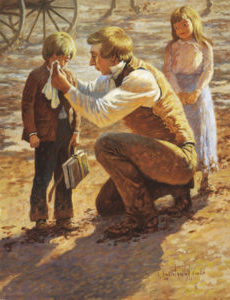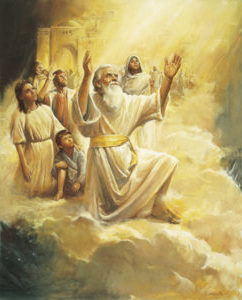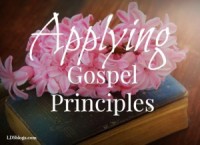“Thou shalt be missed, because thy seat will be empty” (1 Samuel 20:18).
This morning, I attended the funeral of a friend’s 24 year old brother. His untimely death sent shock-waves through the family. “Who’s going to protect me now?” cried one of his girls at the pulpit.

Joseph Smith
I suddenly heard the voices of children in Aleppo and Nice and Dallas, and countless other places around the world where horrible things are happening, asking the same thing.
“If thou art accused with all manner of false accusations; if thine enemies fall upon thee; if they tear thee from the society of thy father and mother and brethren and sisters; and if with a drawn sword thine enemies tear thee from the bosom of thy wife, and of thine offspring, and thine elder son, although but six years of age, shall cling to thy garments, and shall say, My father, my father, why can’t you stay with us? O, my father, what are the men going to do with you? ….” (Doctrine and Covenants 122:6).
This scripture—until now understood by me to be so very specific and individualized—suddenly seems to apply to families around the world. Instead of drawn swords, enemies wield bombs and guns and trucks. And what is a false accusation? That human life is irrelevant, an object, a statistic, or a military strategy.
I finally can begin to visualize the weeping and wailing of the Nephite and Jaredite nations as vengeance and fear consumed them. I’ve never been able to envision their demise before now. In the modern world, while violence increases, fear and anger grasps hearts, minds, communities, and the world.
World In Commotion
“And all things shall be in commotion; and surely, men’s hearts shall fail them; for fear shall come upon all people.”
Enoch saw the God of heaven weeping as He surveyed His children. Why?!
“The Lord said unto Enoch: Behold these thy brethren; they are the workmanship of mine own hands, and I gave unto them their knowledge, in the day I created them; and in the Garden of Eden, gave I unto man his agency;
And unto thy brethren have I said, and also given commandment, that they should love one another, and that they should choose me, their Father; but behold, they are without affection, and they hate their own blood….
Satan shall be their father, and misery shall be their doom; and the whole heavens shall weep over them, even all the workmanship of mine hands; wherefore should not the heavens weep, seeing these shall suffer? …
And it came to pass that the Lord spake unto Enoch, and told Enoch all the doings of the children of men; wherefore Enoch knew, and looked upon their wickedness, and their misery, and wept and stretched forth his arms, and his heart swelled wide as eternity; and his bowels yearned; and all eternity shook” (Moses 7:32, 33, 37, 41).

Enoch and his people are taken up into Heaven.
Enoch saw and grieved for each soul, for each family. In bitterness of soul, he refused to be comforted.
And then something happened–something that we never see in the Nephite genocide or the Jaredite extermination, because those people willfully cast off the Spirit of God. But Enoch, who’d been the brunt of persecution, hatred, and threats and instead chose love, was told by the Lord, “Lift up your heart, and be glad; and look.”
Enoch saw the Son of Man. And his soul rejoiced. Enoch watched the rest of history unfold. Jesus Christ’s Atonement and Resurrection marked the path.
Enoch saw troubles and tribulation and the earth cloaked in darkness during the last days. The Lord promised that righteousness and truth would sweep the earth and gather His people. He promised that He, with Enoch, would receive the righteous. “And we will fall upon their necks, and they shall fall upon our necks, and we will kiss each other. And there shall be mine abode, and it shall be Zion.”

To read more of Delisa’s articles, click here.
Enoch saw all things—great tribulations and wickedness and righteousness—as he experienced both, he “received a fulness of joy.”
Suddenly, the mantra “men are, that they might have joy” in context with oppositions and agency, seems more applicable and desirable than ever.
I mourn with those that mourn, but mourning does not make me fearful or vengeful. Jesus can heal the wounded, even the worst of humanity. He can heal us so that we can do and be better. Because of my Savior Jesus Christ, I choose joy.
About Delisa Hargrove
I am a member of The Church of Jesus Christ of Latter-day Saints. I have moved 64 times and have not tired of experiencing this beautiful earth! I love the people, languages, histories/anthropologies, & especially religious cultures of the world. My life long passion is the study & searching out of religious symbolism, specifically related to ancient & modern temples. My husband Anthony and I love our bulldog Stig, adventures, traveling, movies, motorcycling, and time with friends and family.







Love this blog, Delisa!
Thank you for reading & commenting!! Sure appreciate you!